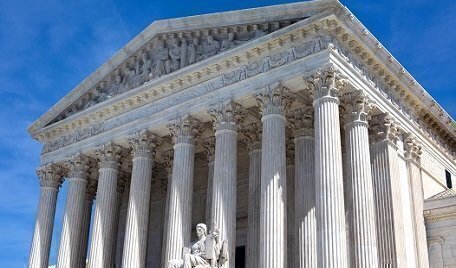The Supreme Court started the process of releasing significant decisions from its current term on Monday, with a much-anticipated ruling on sports betting taking center stage.
 In a 7-2 majority decision, Justice Samuel Alito struck down a 1992 federal law that regulated sports betting on a state level as the Court’s majority took a strong stance on the 10th Amendment and states’ powers.
In a 7-2 majority decision, Justice Samuel Alito struck down a 1992 federal law that regulated sports betting on a state level as the Court’s majority took a strong stance on the 10th Amendment and states’ powers.
In the Murphy v. NCAA case, a federal appeals court in 2013 had said New Jersey couldn’t legalize sports betting because it missed a filing deadline required in that 1992 federal law, the Professional and Amateur Sports Protection Act (or PASPA). The statute had allowed Nevada and several other states to have sports betting, but New Jersey decided not to apply for permission to do so. Instead, decades later it enacted its own law to control sports betting. The Supreme Court didn’t take an appeal from the state in 2014 and New Jersey then tried a different strategy in court.
The Justices were considering if PASPA violated the 10th Amendment’s anti-commandeering provisions, which limit the ability of the federal government to take over or “commandeer” state officials or a state law.
“The PASPA provision at issue here—prohibiting state authorization of sports gambling—violates the anti-commandeering rule,” Alito said. “PASPA’s provision prohibiting state “licens[ing]” of sports gambling schemes also violates the anti-commandeering rule.”
Alito made it clear the law’s effect regulated the activities of state lawmakers. “In either event, state legislatures are put under the direct control of Congress. It is as if federal officers were installed in state legislative chambers and were armed with the authority to stop legislators from voting on any offending proposals. A more direct affront to state sovereignty is not easy to imagine,” he wrote.
Alito also said Congress could regulate sports gambling under certain circumstances but by not using PASPA.
“Congress can regulate sports gambling directly, but if it elects not to do so, each State is free to act on its own. Our job is to interpret the law Congress has enacted and decide whether it is consistent with the Constitution. PASPA is not. PASPA “regulate[s] state governments’ regulation” of their citizens. … . The Constitution gives Congress no such power.”
Justice Ruth Bader Ginsburg, joined by Justice Sonia Sotomayor, dissented from the decision, and they were joined by Justice Stephen Breyer in part of the dissent. Ginsburg argued that the parts of PASPA that were unconstitutional could be severed from the law, leaving the rest of the statute intact.
“In PASPA, shorn of the prohibition on modifying or repealing state law, Congress permissibly exercised its authority to regulate commerce by instructing States and private parties to refrain from operating sports-gambling schemes,” Ginsburg said. “Deleting the alleged “commandeering” directions would free the statute to accomplish just what Congress legitimately sought to achieve: stopping sports gambling regimes while making it clear that the stoppage is attributable to federal, not state, action.”
Today’s ruling could have a significant impact on the sports betting industry. One industry research firm forecast legalized sports gambling could expand to at least 32 states if the Court struck down PASPA.
Scott Bomboy is editor in chief of the National Constitution Center.







